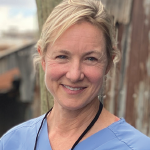Advocacy can be frustrating sometimes because I hate politics. But we need rational people who can be advocates for doctors and patients in a state of constant regulatory change. —David Boisoneau, MD
Explore This Issue
August 2020
Legislation surrounding the coronavirus pandemic is all happening so fast. HIPAA regulations have been relaxed so we can communicate with patients by telephone or video conferencing. Previously, to do this was considered a significant privacy violation—in fact, the Department of Health and Human Services has already placed a notice on its website saying that these situations will be protected from HIPAA violations. For example, if I Facetime a patient tomorrow and they show me a throat problem, and I then document that I saw it on Facetime, the government can’t file a complaint against me for privacy violations.
There was also an announcement that physician licensing now is valid across state borders. This is very helpful in the event some of us may be asked to go to a COVID-19 hot spot to fill in. Doctors are getting sick, and these are worst-case scenario type situations, but it’s important to have these things in place.
There was a lot I didn’t know when I got started, and it can be difficult for doctors to admit when we don’t know something, because we’re told we know everything when we begin to practice. But I learned how to say, “No, I don’t know how that works. Can you explain it to me?”
Also, I’m not a very political guy; I’m a registered Independent and I have no religious affiliation. I just take everything in, evaluate the evidence, and try to make a rational and reasonable course of action based on that. Advocacy can be frustrating sometimes because I hate politics. But we need rational people who can be advocates for doctors and patients in a state of constant regulatory change.
Caring about your mission is the No. 1 criteria for being an advocate. I would get so annoyed at obstacles put in our path that were counterproductive and counterintuitive. I decided I could complain, or I could learn more and maybe be part of figuring out how to fix things.
Medical Education in Neglected Communities
 Ann Messer, MD
Ann Messer, MD
Family Physician, Austin, Texas
Founder and Director, One Good Turn
My advocacy journey started several years ago, when my husband and I decided to cancel Christmas and instead take our kids on one of those adventure trips where you do a service project. We went on an organized trip to Nicaragua with a group called Road Monkey to put in a clean water system. When we got there, they realized my husband and I are doctors—he’s a nephrologist—and the organizers literally shoved a big cardboard box of expired medicines into our hands and said, “Please go take care of the people up in the mountains. They really need you.”
We were game. There were no roads, and burros carried our food. Everywhere we went, hundreds of people came out and stood patiently in line waiting to see these two American doctors with their cardboard box of expired medicines. It was a profound experience.
After we had gone home, I started waking up at night thinking about solutions for those communities. I continued to do service trips and learned so many things. Finally, I decided the best way to have an impact would be to provide basic medical education to people already providing care in the community at the level of their education and understanding.
Four years ago, we started One Good Turn with a very generous development grant and some good PR from Love, Tito’s (a charitable foundation started by the owners of Tito’s Vodka). Our mission is to provide practical medical education and culturally sensitive medical care to neglected communities worldwide. With the grant, we were able to hire one salaried employee: Annie Albrecht, our amazing administrative director. Annie writes the blog for our website, and she, or one of our interns, makes our Instagram and Facebook posts. The rest of our outreach has been through word of mouth.